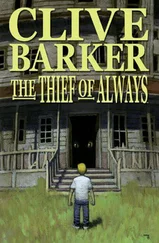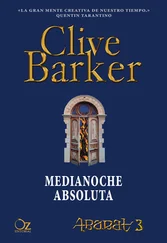Clive Barker - Mister B. Gone
Здесь есть возможность читать онлайн «Clive Barker - Mister B. Gone» — ознакомительный отрывок электронной книги совершенно бесплатно, а после прочтения отрывка купить полную версию. В некоторых случаях можно слушать аудио, скачать через торрент в формате fb2 и присутствует краткое содержание. Год выпуска: 2008, ISBN: 2008, Жанр: Ужасы и Мистика, на английском языке. Описание произведения, (предисловие) а так же отзывы посетителей доступны на портале библиотеки ЛибКат.
- Название:Mister B. Gone
- Автор:
- Жанр:
- Год:2008
- ISBN:978-0-06-018298-4
- Рейтинг книги:3 / 5. Голосов: 1
-
Избранное:Добавить в избранное
- Отзывы:
-
Ваша оценка:
- 60
- 1
- 2
- 3
- 4
- 5
Mister B. Gone: краткое содержание, описание и аннотация
Предлагаем к чтению аннотацию, описание, краткое содержание или предисловие (зависит от того, что написал сам автор книги «Mister B. Gone»). Если вы не нашли необходимую информацию о книге — напишите в комментариях, мы постараемся отыскать её.
Mister B. Gone — читать онлайн ознакомительный отрывок
Ниже представлен текст книги, разбитый по страницам. Система сохранения места последней прочитанной страницы, позволяет с удобством читать онлайн бесплатно книгу «Mister B. Gone», без необходимости каждый раз заново искать на чём Вы остановились. Поставьте закладку, и сможете в любой момент перейти на страницу, на которой закончили чтение.
Интервал:
Закладка:
"I just did. And there are more warriors in the streets. Moving in the ground beneath people's feet."
"Is he telling the truth?" Gutenberg asked the Archbishop.
Before he could answer the question, his Excellency had to chew and swallow the mouthful of pork he'd surreptitiously bitten off. He made one attempt to reply with his mouth still half-full, but his words were incomprehensible. So we waited another minute or so while he thoroughly emptied his mouth. Then he set the pork bone down on the plate where he'd been served it, wiped his hand and mouth with the fine linen cloth laid beside his plate, and finished off by taking a cleansing mouthful of wine before finally saying:
"For all the sad state of him, this visitor of yours knows whereof he speaks. And I know for a fact that angelic forces are here with us, assembled as a consequence of my request to the Pope. Inevitably their presence here aroused the interest of the Fallen One. We should not be surprised at that. Nor should we be surprised that he sent his vermin to do battle with those the Pope requested to protect you."
"So now they fight on the roof of my workshop," Gutenberg said, shaking his head in disbelief.
"And in the street," the Archbishop added, plucking the detail from my own report to fuel his own. In truth, I doubt the man had ever laid his eyes upon any creature that had not first been spiced and roasted to his taste. But the weight of his robes and crosses and rings seemed to lend their heft to his words.
"We are entirely surrounded by soldiers of the Lord," he told Gutenberg. "These are warrior-angels, Johannes, their one purpose to protect you and what you have made from harm."
"Speaking of which — " I began.
"I am not finished!" The Archbishop snapped, a stringy piece of greasy pork escaping with the words to land upon my cheek. His vulgarity made me reorder my execution list somewhat: this pork-spitting Excellency had just been elevated to second place, directly below Quitoon.
Quitoon. Ha. Though I'd come here in pursuit of him, so much else had happened, or was in the process of happening, that I'd forgotten him for a time, which had been a pleasant release. For too many years I'd thought of him and only of him: I'd been perpetually concerned for his comfort, intimidated by his rages, anguished whenever he staged one of his departures, and pathetically grateful when he returned to me. But paradoxically this final pursuit of him had brought me to a stage where a drama greater than love was being played, a stage where the agent of destruction that my sorrow had made of me was ideally placed to do harm. Indeed, if even a part of what had been claimed on behalf of Gutenberg's creation was true, then by destroying it I would — oh God, how strange to even shape the words, much less consider their reality — be wounding the world.
There was a sweet thought.
"What do you think, Mister B.?"
I had briefly lost track of the conversation as I'd mused on love and destruction. To gain myself a little thinking time, I repeated the question:
"What do I think? Now that you ask, what do I think?"
"How can there be any doubt?" the Archbishop said, slamming the base of his Shepherd's crook on the bare boards of the workshop floor to emphasize his feelings. "The Devil will not carry this day."
Now I understood what I'd missed: Gutenberg had voiced some doubt as to how the battle being raged around his house (and on the roof all the way up to Heaven, and in its bowels all the way down to Hell) would come to an end. To judge by the fretful look he wore, Gutenberg was by no means certain that the angelic legion would triumph. The Archbishop's response was unequivocal.
"Do not doubt the Lord's power, Johannes," he breathed.
Gutenberg offered no reply to this, which further inflamed the Archbishop, who again hammered the floorboards with his dazzling crook.
"You!" he said, turning in my direction and striking the floor a third time, just in case I missed the fact that I was now being blessed with his attentions. "Yes, Mister B., you! What is your opinion on the matter?"
"That we're perfectly safe, your Excellency. Yes, the battle is fierce. But it rages outside. In here, we are protected by your presence. No soldier of Hell would dare enter this fortress with your Excellency's holy presence to drive him off."
"You see?" the Archbishop said. "Even your dream visitor understands."
"Besides," I added, unable to resist the fun of this, "how would he enter? Just knock on the front door and invite himself in?"
Gutenberg seemed to see the sense in this, and was reassured.
"Then nothing can undo what I have made?"
"Nothing," the Archbishop said.
Gutenberg looked at me.
"Nothing," I said.
"Perhaps I should show it to you then," he suggested.
"Only if you wish to," I replied lightly.
He smiled. "I do."
So saying, he led me across the room to the heavy door with DO NOT ENTER carved into it. He knocked, rapping out a code of entry, and the door, which was twice the thickness of any door I'd ever seen, was opened. I could not see what was inside; Gutenberg was blocking my view. But I caught the oily, bitter smell that came through the door like a greasy wave.
"What's that smell?"
"Ink, of course," Gutenberg replied. "To print the words."
I should have taken the warning that "of course" offered me: He expected me to know that he was more than something as commonplace as a copier of books. But I blundered on, stupidly.
"So you copy books?" I said. "What have you invented? A new quill?"
It was meant as a joke, but Gutenberg did not see the humor in it. He stopped on the bottom step, preventing me from descending any further.
"We don't copy books here," he said, his tone far from friendly.
I felt the weight of the Archbishop's hand and rings upon my shoulder. He was behind me, blocking my exit with crook and girth.
"Why so many questions, Botch?" he said.
"I like to learn."
"But you've walked through Gutenberg's dreams. Or at least you claim you have. How could you possibly pass through the mind of a man consumed by one great labor, and not see that labor?"
I was trapped, caught by the His Holiness behind, the genius in front, and my own foolish mouth in the middle.
It was my tongue that had got me into this little mess, so I silently entreated it now to get me out.
"You speak of your Reprodukagraph, I assume," I said, my eyes, I'm certain, registering a certain shock at hearing this five-syllable bizzarity emerge from between my lips unbidden.
"Is that what I should call it?" Gutenberg said, the ice that had been in his voice moments before now melted away. He took the final step down into the workshop floor and turned to look at me. "I was thinking I'd call it a printing press."
"Well, you could, I suppose," I replied, glancing back at the Archbishop as I spoke and giving him a look of aristocratic ill-temper. "Would you be so kind as to lift your hand off my shoulder, your bejewelledness?"
There were a number of barely suppressed guffaws from the workers in the immense room behind Gutenberg, and even the stern genius himself allowed laughter to bloom in his eyes when he heard my addressing the Archbishop in this fashion. His Excellency duly removed his hand, not without first harshly digging his fingers and thumb into my flesh to inform me silently that he would be keeping a close watch on me. Gutenberg, meanwhile, turned at the bottom of the stairs, inviting me to follow. I did so, stepping down into the workshop itself, finally laying eyes on the apparatus that was the cause of all the conflict around, above, and below the Gutenberg house.
The invention looked very remotely like a wine press, but there was a great deal about its construction that was purely of Gutenberg's design. I watched as one of the three men attending to the operation of the press took a sheet of paper and carefully placed it on a bed of ink-stained wood.
Читать дальшеИнтервал:
Закладка:
Похожие книги на «Mister B. Gone»
Представляем Вашему вниманию похожие книги на «Mister B. Gone» списком для выбора. Мы отобрали схожую по названию и смыслу литературу в надежде предоставить читателям больше вариантов отыскать новые, интересные, ещё непрочитанные произведения.
Обсуждение, отзывы о книге «Mister B. Gone» и просто собственные мнения читателей. Оставьте ваши комментарии, напишите, что Вы думаете о произведении, его смысле или главных героях. Укажите что конкретно понравилось, а что нет, и почему Вы так считаете.











